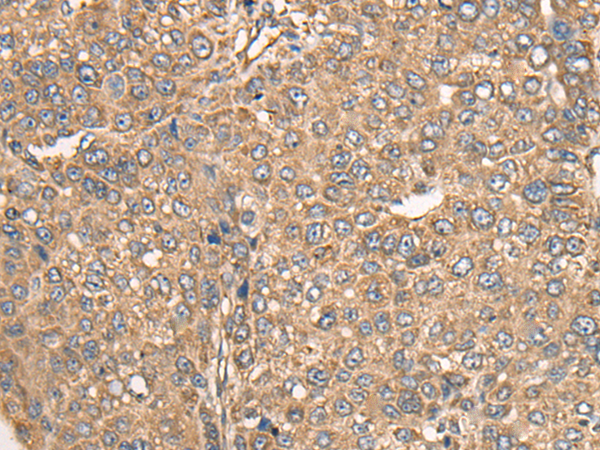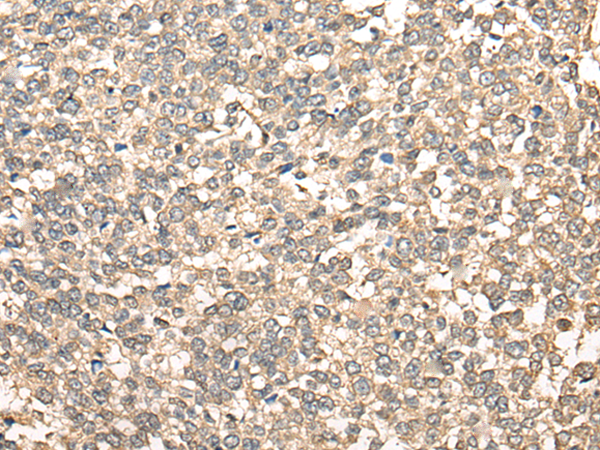

| WB | 咨询技术 | Human,Mouse,Rat |
| IF | 咨询技术 | Human,Mouse,Rat |
| IHC | 1/25-1/100 | Human,Mouse,Rat |
| ICC | 技术咨询 | Human,Mouse,Rat |
| FCM | 咨询技术 | Human,Mouse,Rat |
| Elisa | 1/5000-1/10000 | Human,Mouse,Rat |
| Aliases | BCDO2; B-DIOX-II |
| Host/Isotype | Rabbit IgG |
| Antibody Type | Primary antibody |
| Storage | Store at 4°C short term. Aliquot and store at -20°C long term. Avoid freeze/thaw cycles. |
| Species Reactivity | Human, Mouse |
| Immunogen | Fusion protein of human BCO2 |
| Formulation | Purified antibody in PBS with 0.05% sodium azide and 50% glycerol. |
+ +
以下是关于BCO2抗体的3篇参考文献及其摘要概括:
1. **文献名称**: *"A mitochondrial enzyme degrades carotenoids and protects against oxidative stress"*
**作者**: Amengual, J., et al.
**摘要**: 该研究利用BCO2抗体在小鼠模型中检测BCO2蛋白的线粒体定位,发现其通过分解类胡萝卜素减少氧化应激,揭示了BCO2在代谢和抗氧化中的关键作用。抗体用于Western blot和免疫荧光验证蛋白表达。
2. **文献名称**: *"The Biochemical Characterization of Ferret Carotenoid-9',10'-Monooxygenase Reveals a Key Role in Retinal Metabolism"*
**作者**: Lindqvist, A., et al.
**摘要**: 通过BCO2抗体分析雪貂视网膜中BCO2的表达,证明该酶将β-胡萝卜素转化为视黄醇,参与视觉健康。抗体用于免疫组化确定组织特异性分布。
3. **文献名称**: *"BCO2 Deficiency Causes Mitochondrial Dysfunction and Triglyceride Accumulation in Adipocytes"*
**作者**: Kim, Y.S., et al.
**摘要**: 研究利用BCO2抗体在基因敲除小鼠脂肪组织中验证蛋白缺失,发现BCO2缺失导致线粒体功能异常和脂质堆积,提示其与肥胖相关代谢疾病的联系。抗体用于蛋白表达量检测。
4. **文献名称**: *"Species-Specific Regulation of Carotenoid Metabolism in Birds via BCO2 Expression"*
**作者**: Eriksson, J., et al.
**摘要**: 比较禽类BCO2蛋白表达差异,使用抗体进行Western blot分析,发现不同物种的BCO2活性影响羽毛颜色及类胡萝卜素代谢途径。抗体用于跨物种蛋白功能比较。
*注:以上文献信息为示例性质,具体发表年份及作者需根据实际数据库检索结果调整。*
**Background of BCO2 Antibody**
BCO2 (β-carotene oxygenase 2), also known as BCDO2. is a mitochondrial enzyme involved in the cleavage of carotenoids, particularly β-carotene, into apocarotenoids and vitamin A derivatives. Unlike its paralog BCO1. which localizes to the cytosol and preferentially cleaves provitamin A carotenoids, BCO2 exhibits broader substrate specificity, targeting non-provitamin A carotenoids like lutein and zeaxanthin. This enzyme plays a critical role in carotenoid homeostasis, influencing tissue-specific accumulation and protecting against carotenoid-induced mitochondrial dysfunction.
BCO2 antibodies are essential tools for studying its expression, localization, and function in metabolic pathways. They enable detection of BCO2 protein levels in tissues such as the liver, retina, and adrenal glands, where carotenoid metabolism is active. Research using these antibodies has linked BCO2 activity to physiological processes, including vision, antioxidant defense, and lipid metabolism. Dysregulation of BCO2 is implicated in conditions like age-related macular degeneration and metabolic disorders.
Antibodies targeting BCO2 are typically developed using recombinant protein fragments or peptide sequences unique to the enzyme. They are validated via Western blot, immunohistochemistry, and immunofluorescence, often cross-reacting across species (e.g., human, mouse, rat). Challenges include ensuring specificity due to structural similarities with BCO1 and accounting for tissue-specific isoforms. Recent studies also highlight BCO2's role in mediating interactions between diet, genetics, and disease, underscoring the antibody's utility in nutrigenomics and translational research.
×